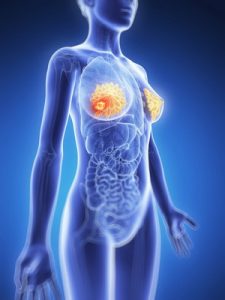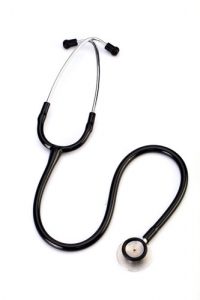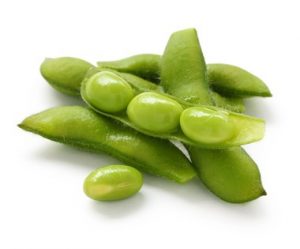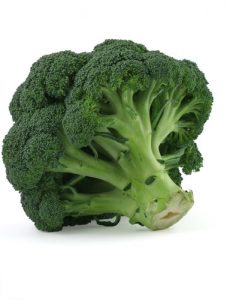Do Soy & Cruciferous Vegetables Reduce Breast Cancer Treatment-Related Symptoms?
Author: Dr. Stephen Chaney
 The topic of soy and breast cancer has been a controversial subject for years. If you read Dr. Strangelove’s nutrition blogs, you would be led to believe that soy causes breast cancer and shortens the lifespan of breast cancer survivors.
The topic of soy and breast cancer has been a controversial subject for years. If you read Dr. Strangelove’s nutrition blogs, you would be led to believe that soy causes breast cancer and shortens the lifespan of breast cancer survivors.
This is one of the many myths I have debunked in my book “Slaying The Supplement Myths.” Multiple clinical studies have proven that soy reduces the likelihood of developing breast cancer. Several clinical studies have shown it also decreases recurrence of breast cancer and enhances survival following breast cancer treatment. Other clinical studies have found no effect of soy on recurrence or longevity in breast cancer survivors. Zero studies have found any detrimental effects of soy in breast cancer survivors.
So, is there a true relationship between soy and breast cancer survivors? These studies have all shown that soy is part of a healthy diet and should not be feared by women who have survived breast cancer.
Breast cancer survivors suffer from several treatment-related side effects. These include menopausal symptoms, fatigue, joint problems, hair thinning, and memory loss.
The most recent headlines claim that soy and cruciferous vegetables (broccoli, cauliflower, cabbage, Brussels sprouts, kale and related vegetables) decrease menopause and other treatment-related symptoms in breast cancer survivors. If you have seen those headlines, you are probably wondering:
- Are they true?
- Should I increase soy consumption following breast cancer treatment?
How Was The Study Designed?
 This study (SJO Nomura et al, Breast Cancer Research and Treatment, 168: 467-479) enrolled 192 Chinese-American and 173 non-Hispanic White women in the San Francisco Bay area between 2006 and 2012. The average age of the women was 57. They were all breast cancer survivors who had been treated 1-5 years previously. Most had been treated at least 2 years previously.
This study (SJO Nomura et al, Breast Cancer Research and Treatment, 168: 467-479) enrolled 192 Chinese-American and 173 non-Hispanic White women in the San Francisco Bay area between 2006 and 2012. The average age of the women was 57. They were all breast cancer survivors who had been treated 1-5 years previously. Most had been treated at least 2 years previously.
The participants were recruited by mail and filled out questionnaires which provided demographic data, health information, and information on treatment-related symptoms. They also filled out a food frequency questionnaire designed to estimate intake of soy foods and cruciferous vegetables.
In terms of food consumption, the range was:
- 0 to 24 gram/day for soy.
- <33 grams/day to >71 grams/day for cruciferous vegetables. For reference, one serving (1/2 cup) of cooked broccoli weighs 78 grams.
Soy And Breast Cancer Survivors?
 In looking at the effect of soy and cruciferous vegetables on treatment-related symptoms, it is important to understand that the two groups of women had different baseline characteristics.
In looking at the effect of soy and cruciferous vegetables on treatment-related symptoms, it is important to understand that the two groups of women had different baseline characteristics.
- The Chinese-American women had a higher average intake of both soy and cruciferous vegetables.
- The Non-Hispanic White women were more likely to experience treatment-related worsening of menopausal symptoms.
- The Chinese-American women were more likely to experience fatigue, joint problems, hair thinning, and memory loss.
With that in mind, here are the results of the study:
Soy intake:
 When all women in the study were grouped together, high (>24 grams/day) versus low (0 grams/day) soy intake was associated with a 57% reduction in fatigue.
When all women in the study were grouped together, high (>24 grams/day) versus low (0 grams/day) soy intake was associated with a 57% reduction in fatigue.- For Non-Hispanic White women high versus low soy intake was associated with a 71% reduction in menopause symptoms and a 75% reduction in fatigue.
- The effect of soy on treatment-related symptoms was non-significant for Chinese-American women, perhaps because the baseline intake of soy was greater for this group.
Cruciferous vegetable intake:
- When all women in the study were grouped together, high (>71 grams/day) versus low (<33 grams/day) cruciferous vegetable intake was associated with a 50% reduction in menopause symptoms.
- For Chinese-American women, high versus low intake of cruciferous vegetables was associated with a 39% reduction in memory loss.
- The effect of cruciferous vegetables on treatment-related symptoms was non-significant for Non-Hispanic White women.
The authors concluded: “In this population of breast cancer survivors, higher soy and cruciferous vegetable intake was associated with less treatment-related menopausal symptoms and fatigue. To confirm study findings, additional research is needed that explores the relationship between diet and breast cancer treatment-related symptoms…in a larger, diverse study population.”
What Does This Study Mean For You?
 This is a small, preliminary study that needs to be repeated before any definitive recommendations can be made. Here are my take-home points from this study.
This is a small, preliminary study that needs to be repeated before any definitive recommendations can be made. Here are my take-home points from this study.
- Soy is an excellent source of high-quality plant protein. We already know there is no reason to avoid soy following breast cancer treatment. This study provides another reason to include soy as part of a healthy, plant-based diet following treatment. This study also provides a rationale for including cruciferous vegetables as part of a healthy, plant-based diet following treatment.
- However, 24 grams of soy represents a single serving of many soy foods. This study does not provide a rationale to increase soy consumption beyond a single serving.
- The danger after studies like this are publicized is that breast cancer survivors will just focus on soy and cruciferous vegetables in their diet. This study looked at the effects of soy and cruciferous vegetables based on their potential effects on menopausal symptoms. However, they are just two components of a healthy, plant-based diet, and we know that primarily plant-based diets are associated with a decreased risk of breast cancer.
In my opinion, we need to focus less on “magic bullet” approaches (single nutrients and single foods) and focus more on holistic approaches. We should be asking how holistic, healthy diets influence recovery from breast cancer and reduction of treatment-related symptoms. We should be encouraging breast cancer survivors to focus on all aspects of a healthy diet, not just soy and cruciferous vegetables.
The Bottom Line
The topic of soy and breast cancer has been a controversial subject for years. If you read Dr. Strangelove’s nutrition blogs, you would be led to believe that soy causes breast cancer and shortens the lifespan of breast cancer survivors.
This is one of the many myths I have debunked in my book “Slaying The Supplement Myths.” Multiple clinical studies have shown that soy is part of a healthy diet and should not be feared by women who have survived breast cancer.
The most recent headlines claim that soy and cruciferous vegetables (broccoli, cauliflower, cabbage, Brussels sprouts, kale and related vegetables) decrease menopause symptoms and fatigue in breast cancer survivors.
These headlines are based on a small, preliminary study that needs to be repeated before any definitive recommendations can be made. Here are my take-home points from this study.
- Soy is an excellent source of high-quality plant protein. We already know there is no reason to avoid soy following breast cancer treatment. This study provides another reason to include soy as part of a healthy, plant-based diet following treatment. This study also provides a rationale for including cruciferous vegetables as part of a healthy, plant-based diet following treatment.
- However, 24 grams of soy represents a single serving of many soy foods. This study does not provide a rationale for increasing soy consumption beyond a single serving.
- This study focused on soy and cruciferous vegetables based on their potential effects on menopausal symptoms. However, they are just two components of a healthy, plant-based diet, and we know that primarily plant-based diets are associated with a decreased risk of breast cancer. In my opinion, we need to focus less on “magic bullet” approaches (single nutrients and single foods) and focus more on holistic approaches. We should be asking how healthy diets influence recovery from breast cancer and reduction of treatment-related symptoms.
For more details read the article above.
These statements have not been evaluated by the Food and Drug Administration. This information is not intended to diagnose, treat, cure or prevent any disease.
